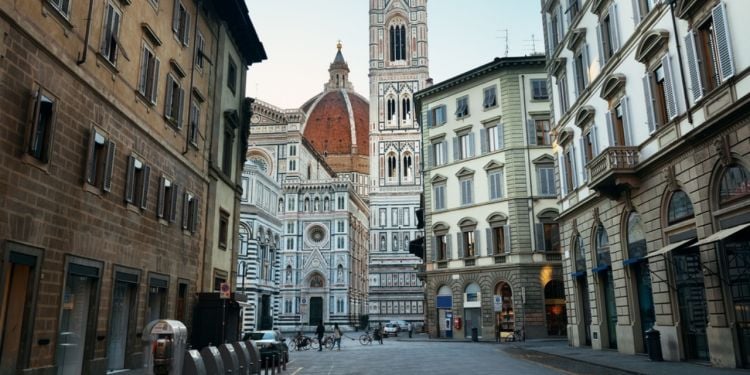Finding a job in Florence

It's easy to fall in love with Florence, so it's not surprising that the city is one of the most popular destinations for expatriates. A famous city of art, Florence shines with its architecture, food, wine, strong identity and Tuscan dolce vita, just a stone's throw from the Chianti hills. The city also offers many opportunities for expatriates who wish to settle here. While the regional workforce has certainly been affected by the global economic crisis, in Florence, the trend is much more benign, thanks in part to tourism.
Unlike the more industrial cities of Milan and Turin, Florence's economy is largely based on tourism and crafts, while the professional and financial sectors continue to grow. The service sector accounts for 70% of employment in the region, with the vast majority of people employed in commerce, fashion, hotels and restaurants. On the other hand, agricultural production still plays an important role in the local economy, with many of Tuscany's important farms and wineries being located near Florence, in the Chianti region.
Florence also has a reputation as a center of creativity, with writers and artists flocking to the city for centuries, keen to learn about traditional arts and literature, as well as more unusual activities such as leather binding and jewelry making. Florence is a city where you can still find highly skilled craftsmen who are sought after worldwide, including tanners, milliners and potters. These are generally family businesses that are passed on from generation to generation. In fact, every year in Florence, the International Handicraft Fair, Mostra dell'Artigianato, is held at the Firenze Fiera. And if you're a fashion lover, you'll be pleased to know that Florence hosts the Pitti Immagine Uomo fair twice a year, the world's most important platform for men's clothing and accessories collections.
Economic climate in Italy
Italy has been hit hard by the global financial crisis of recent years, including the Covid pandemic and the war in Ukraine, as Italy is a country heavily dependent on Russian gas. Currently, the unemployment rate is 7.8% among the general population and 23.0% of the unemployed are young people (November 2022 figures / ISTAT), which means that competition for jobs is high. Nevertheless, the engineering, tourism, pharmaceutical, food and technology sectors are particularly in demand.
Thanks to the introduction of the Jobs Act in 2015, the Italian labor market has changed considerably. This law abolished the most precarious employment contracts and reaffirmed workers' rights, such as the right to unemployment. All of this has allowed Italy to recover from its European peers, making the country fairer and more attractive to local and international investors.
Sectors that recruit expats in Florence
One of the strengths of the economic system in Florence is the establishment of the SEL (Sistemi Economici Locali), which guarantees a network of relationships, exchanges and services to the companies that are part of it. The backbone of the Florentine economy is industry, including tourism, fashion and gastronomy, with an incidence of 27%, made up of 105,000 small and medium-sized enterprises, to which are added some of the most important companies in the world. Together with trade, these sectors represent 50% of the Florentine economy.
Key sectors in Florence
Tourism is a popular sector for expatriates seeking employment in Florence, both students and employees. There are many hotels, bed and breakfasts, agriturismos, spas and restaurants, all looking for workers who are fluent in languages, mainly English, especially in the high season.
The most common jobs in Florence include waiters, bartenders, delivery people, cooks, tour guides, drivers and receptionists. Feel Florence is the official website of the city and the città metropolitana. It offers itineraries, lists of accommodations in Florence, and experiences, but also all kinds of useful information and interesting contacts for the sector.
Many tourist agencies are also looking for guides, and if some are already full, it is helpful to contact several of them to be on their waiting list. Today, it is even common for independent travel planners to start up their own businesses and offer personalized solutions to tourists. Beware, however, that you must have a thorough knowledge of the city, its history and a tourist guide's license.
Real estate management is another option for bilingual expatriates or expatriates with a good written and oral understanding of Italian. Indeed, real estate is particularly flourishing, especially luxury real estate for foreigners. So if you are looking for a full-time job in Florence, consider the offers in this sector.
If you want to focus on a different type of industry in your job search, consider the food and wine industry, which is another favorite sector in Florence. The city and its surroundings offer abundant work in agriculture and viticulture thanks to the surrounding countryside, although you may need specific skills or be willing to volunteer initially. Fashion in Florence is more traditional and very much rooted in craftsmanship, much more so than in Milan, for example. That said, big names such as Gucci and Ferragamo are based in Florence.
Although smaller than the tourist industry, craft production plays an important role in the local economy. Indeed, Florence has a strong craft culture. The city is particularly famous for the production of jewelry, perfumes, ceramics, fabrics and leathers, as well as novel production techniques such as marbling and mosaics. If you have strong technical skills and experience, these options will be important in your job search in Florence.
Other sectors to find a job in Florence
The pharmaceutical chemical sector in Florence, which has many medium and large laboratories and companies, is not to be underestimated. This is the case, for example, of Menarini, a company now present in more than 100 countries worldwide.
Like other major Italian cities, teaching English as a foreign language is popular among expatriates in Florence. English as a Second Language (ESL) teaching positions in private and language schools are advertised on sites such as TEFL. Also, log on to the ESL Base website to view listings of language schools based in Florence and contact them directly. The British Council also offers opportunities to move to Italy through its language support programs.
Florence is home to the Università degli Studi di Firenze, one of the oldest universities in Italy, founded in 1321. Other prestigious schools and international institutions offer jobs in Florence, so contact them to apply.
Good to know:
Florence's economy is largely made up of small businesses. For example, 41% of employees work in companies with less than 10 employees and only 9% in companies with more than 250 employees.
In Tuscany, and particularly in Florence, the percentage of self-employed workers is higher than the Italian average.
Finding a job in Florence
LinkedIn is a practical starting point for looking for a job in Florence, but many other job boards such as Indeed, Monster, Glassdoor, Infojobs, and Clicca Lavoro will also be helpful. If you are looking for a job in the tourism and hospitality sector (hotels, restaurants and cafés), visit Turismo Lavoro, a local authority that lists job vacancies for the whole of Tuscany.
You can also check the classified ads in newspapers such as The Florentine and The Local.
Locally, you can register with employment and recruitment agencies in Florence, such as Ali spa, GiGroup, Randstad, or Adecco, which have branches in Florence. ARTI, the Tuscan regional employment agency, also publishes interesting advertisements online.
EURES - European Employment Mobility Portal is another useful search tool for information on job vacancies, overviews of the Italian market and working conditions in Italy. The website also provides a useful CV posting service for job seekers.
You can also contact the employment center of your consulate. Besides, Florence is full of networking and expatriate groups, so ask around, as it may be useful to join one in your job search.
Everyone will tell you that networking is an excellent way to find work in Italy. Indeed, it is said that 70% of jobs are found through networking and simple contacts can sometimes turn into collaborators. Let's not forget Expat.com's Italy forum and its jobs section.
Important:
The language barrier is often a problem for new expatriates in Italy. However, for a successful move to Florence, it is recommended to have a good command of Italian. This will help you in your professional life and handling daily tasks, for example, with the local administration.
Please note that expatriates from other countries wishing to work in Florence need to present a valid identity document and a Permesso di Lavoro, which must be applied for before leaving the country of origin (for more information on this subject, see our article "Long-stay visas for Italy"). If you are a citizen of a European country, you will not need a work visa, you will only need to apply for a residence certificate. See our article "Residence permit in Italy".
CV and cover letter in Florence
When applying for a job in Florence, you will need to provide a CV and a cover letter - lettera di presentazione - in Italian. It is sometimes optional in job advertisements, but we advise you to provide one in addition to your CV. Indeed, candidates who take the time to introduce themselves are generally appreciated by Italian employers. Emphasize your experience, the languages you speak, and what makes you different from other potential candidates. You can also indicate the added value you can bring to the company. The cover letter should be written in Italian, but some international companies may request it in English only.
Regarding the CV, you can provide it in Europass format, which is very popular. For creative jobs in the fashion, design and marketing sectors, however, it is advisable to personalize your CV and make it a unique business card. It is essential to include your contact details and nationality (especially if you are a third-country national), as some multinational companies have specific policies in place. Then describe your previous work experience, starting with your most recent experience and ending with your qualifications and skills.
Good to know:
Avoid using Google Translate to write your CV and/or cover letter. If you do not have a good command of Italian, write them in English. If it is mandatory to send your CV and cover letter in Italian, seek the services of a translator or get help from someone you know.
Make sure you always indicate your language proficiency level, especially Italian, according to the Common European Framework of Reference for Languages (CEFR).
Accommodation and work in Florence
Regardless of the duration of your stay in Florence, it is generally advisable to find accommodation close to your workplace. Florence has a less efficient public transport service than Milan, for example.
However, if you find a job in the historical centre, rent prices are likely to skyrocket as these are prestigious areas usually reserved for historic palazzi, family homes and luxury accommodation for foreigners. In addition, the size of your accommodation will usually not be proportionate to its cost. They are usually studio flats, "bilocali" or "trilocali", i.e., flats with two or three rooms, respectively.
Consider starting your accommodation search in areas slightly outside the center, for example, Campo di Marte or Bolognese, or in the south, the so-called oltrarno area. Read our article "Finding accommodation in Florence" to identify the type of area that suits you best in your new professional life.
Useful links :









